|
|
|
Sort Order |
|
|
|
Items / Page
|
|
|
|
|
|
|
| Srl | Item |
| 1 |
ID:
106273
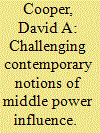

|
|
|
| 2 |
ID:
106272
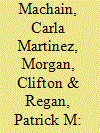

|
|
|
|
|
| Publication |
2011.
|
| Summary/Abstract |
Global terrorism and local rebellion are observed rather frequently; solutions appear to be rather sparse. A common strategy adopted by governments is to attempt to deter potential rebels from engaging in acts of violence, often by responding to attacks with violent reprisals directed at the populace from which the rebels are recruited. The logic supporting such a strategy follows from a theory of deterrence that we believe is underdeveloped. This theory focuses heavily on the credibility of the deterrent threat and on ensuring that the cost imposed by retaliation is high. This ignores the flip side of the deterrent threat-that is, the promise that if one does not misbehave (by engaging in acts of rebellion), one will not suffer retaliatory punishment. Policy designed to ensure that punishment is swift and severe (and perhaps disproportional) can undermine deterrence and actually encourage more potential rebels to become active. Using a game-theoretic model, we show that successful deterrence requires a strategy in which retaliation is proportionate and directed only at the guilty, as well as being certain. Moreover, potential rebels must believe that the innocent will have attractive opportunities outside of joining the insurgency as well as that the innocent will not be punished. We provide empirical illustrations of our thesis from participants in the Palestinian uprising, including several who have taken up arms against Israel.
|
|
|
|
|
|
|
|
|
|
|
|
|
|
|
|
| 3 |
ID:
106269
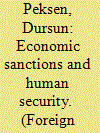

|
|
|
|
|
| Publication |
2011.
|
| Summary/Abstract |
Despite the abundance of country-specific evidence and policy debate on the humanitarian effects of sanctions, there has not been any cross-national empirical research that examines the human cost of sanctions. In this study, I offer a quantitative analysis of the effect that economic sanctions have on public health conditions in target countries. I use the child mortality rate among under five-year olds as a proxy for health status and utilize time-series cross-nation data for the 1970-2000 period. According to the results, the public health effect of sanctions is largely conditional on the extent to which economic coercion is costly on the target economy. The United States as a sender is also likely to increase the negative impact of sanctions on public health conditions. The economic wealth of target countries is unlikely to play any significant interactive role in mitigating the effect of economic coercion on public health. Similarly, the involvement of an intergovernmental organization (IGO) in sanction imposition has no discernable impact on child mortality.
|
|
|
|
|
|
|
|
|
|
|
|
|
|
|
|
| 4 |
ID:
106270
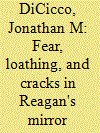

|
|
|
|
|
| Publication |
2011.
|
| Summary/Abstract |
Investigation into an often-overlooked Cold War episode reveals a tipping point in the Reagan administration's approach to the Soviet Union. In November 1983, NATO military exercise "Able Archer 83" reportedly touched off a crisis atmosphere among Soviet officials who feared a surprise nuclear attack. Intelligence reports about the war scare startled US President Ronald Reagan, altering his understanding of Soviet threat perceptions and prompting him to embrace his moderate advisers' recommendations that the administration take a more conciliatory approach toward the country Reagan had earlier labeled the "evil empire." By highlighting Soviet fears of the United States, intelligence stemming from Able Archer 83 cracked Reagan's mirror images and catalyzed a policy shift from hostile confrontation toward cautious cooperation. The case study identifies facilitating conditions for the shift and yields counterintuitive insights relating to international crises, perception and misperception, and the domestic politics of rivalry.
|
|
|
|
|
|
|
|
|
|
|
|
|
|
|
|
| 5 |
ID:
106274
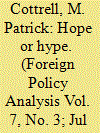

|
|
|
|
|
| Publication |
2011.
|
| Summary/Abstract |
Many foreign affairs cognoscenti agree that the United States needs to restore its standing as a legitimate world leader and recommit to international institutions in order to address the world's most pressing problems. However, these prescriptions mean relatively little without first examining what legitimate leadership entails and whether such leadership is, in fact, possible. This article proceeds in three steps. First, it discusses the meaning of legitimate leadership in the context of international institutions and underscores the enduring challenges the United States faces in this regard. Second, it highlights the domestic political impediments that ineluctably constrain the implementation of a consistent and cohesive US foreign policy. Finally, the article suggests that if the US legitimacy deficit is to some degree a fact of life, we should rethink which governance arrangements are most capable of harnessing US power for a greater good and devote increased attention to what legal scholars call "new governance."
|
|
|
|
|
|
|
|
|
|
|
|
|
|
|
|
| 6 |
ID:
106268
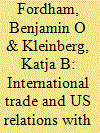

|
|
|
|
|
| Publication |
2011.
|
| Summary/Abstract |
US relations with China are critically important for the future of world politics. They are also a useful case in which to test the individual-level implications of the liberal commercial peace argument. A plausible case can be made on both sides of the claim that China poses a security threat to the United States. China's economy is growing far faster than the United States' economy, while the country remains a communist autocracy. At the same time, trade between the United States and China has expanded dramatically in the last three decades. Its dual role as a major trading partner and a growing international rival generates substantial uncertainty about China's future status as friend or foe. Using data from a recent survey by the Chicago Council on Foreign Relations, we find that economic interests help explain individual Americans' assessment of China as a threat and their views concerning hostile policies toward that country. Those who stand to benefit from trade with China hold more positive views of the country and oppose conflictual foreign policies with respect to it. Those whose incomes are likely to decline because of trade with China tend to take the opposite position on these questions.
|
|
|
|
|
|
|
|
|
|
|
|
|
|
|
|
| 7 |
ID:
106271
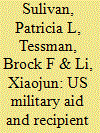

|
|
|
|
|
| Publication |
2011.
|
| Summary/Abstract |
What can states expect to receive in return for the military aid they provide to other states? Can military aid buy recipient state compliance with donor objectives? In this study, we systematically investigate the effects of US military assistance on recipient state behavior toward the United States. We build on existing literature by creating three explicit theoretical models, employing a new measure of cooperation generated from events data, and controlling for preference similarity, so that our results capture the influence military aid has on recipient state behavior independent of any dyadic predisposition toward cooperation or conflict. We test seven hypotheses using a combination of simultaneous equation, cross-sectional time series, and Heckman selection models. We find that, with limited exceptions, increasing levels of US military aid significantly reduce cooperative foreign policy behavior with the United States. US reaction to recipient state behavior is also counterintuitive; instead of using a carrot-and-stick approach to military aid allocations, our results show that recipient state cooperation is likely to lead to subsequent reductions in US military assistance.
|
|
|
|
|
|
|
|
|
|
|
|
|
|
|
|
|
|
|
|
|